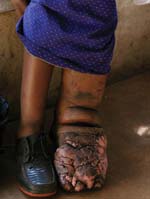5.1 Perspectives on health and illness
Disease, illness and sickness are all negative notions reflecting negative occurrences in human life. Disease calls for action by health workers who will be asked to identify and treat the occurrence – and then care for the person who has the disease. Illness changes the actions of the individual, making him or her communicate their personal perspective of the negative occurrence to others, for example by calling for help.
Disease is usually considered to be independent of subjective opinion and is objectively measurable through various medical tests. Illness, however, is the subjective feeling of the individual. These feelings are often referred to as symptoms, and ‘illness’ can only be indirectly accessed through the individual’s reports. ‘Sickness’ is a social identity as a result of the poor health of an individual defined by others with reference to the activity of that individual. Sickness in this sense is a social phenomenon. Sickness is assessed by measuring levels of performance with reference to expected social activities when these levels fail to meet social standards.
Disease, illness, and sickness are notions reflecting negative occurrences in human life. Their major difference is based on who perceives these negative occurrences. What do you think are the major features of each condition?
Disease is a negative bodily occurrence that is usually determined or confirmed by health workers. Illness is a negative bodily occurrence that is decided by the person themselves. Sickness is a negative bodily occurrence as determined by society or its institutions. And of course there is often overlap: people can have a disease, feel ill and be perceived as sick by others (Figure 5.1).

Learning Outcomes for Study Session 5
